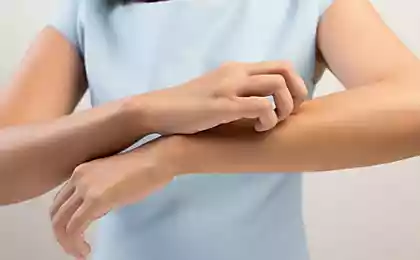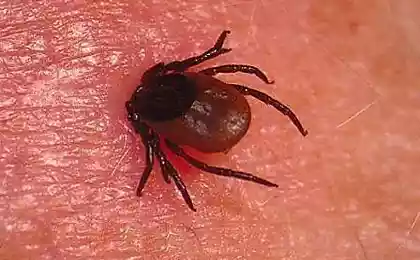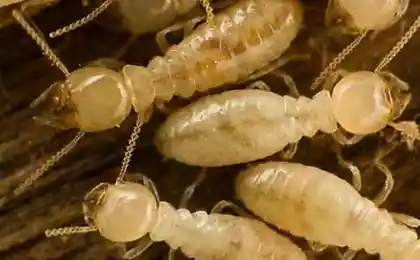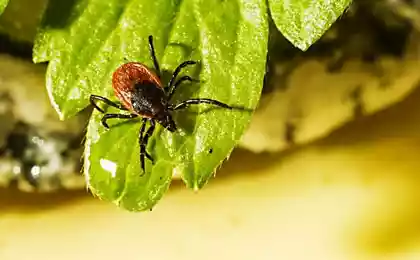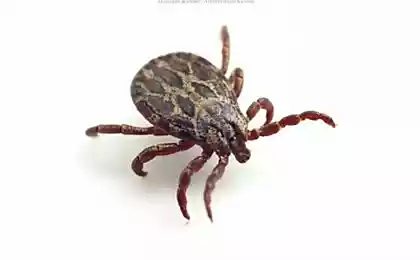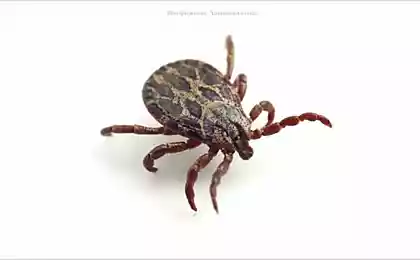201
What to do if you bite a tick
Perhaps one of the “experienced”, after reading the title, will say: “Why is it wise?” I pulled out the tick, rubbed the bite site with alcohol, and that was it.” I did it myself. However, she did not pull out the bloodsucker with her own hands - she asked her neighbor-nurse. But that doesn't change the point. Ticks in those parts where we then spent the summer, raged annually, but at the same time were distinguished by “excellent health”. I had never heard of anyone seriously injured by their bite, so I considered my frivolity quite justified. And then a friend told me.The True Story of Friends...
Once upon a time there was an ordinary family – quite young people, our peers. Worked, and on weekends, like many, went to the dacha. And on one of those trips, a woman was bitten by a tick. Well, we pulled him out, we treated the bite site, we didn't go anywhere. A few days later, she felt sick, then the temperature rose, she became worse. They called an ambulance. But the doctor just shrugged his hands: it was too late to do anything. The finale of the usual trip to the country was tragic.
In general, everyone makes their own choice - to risk their lives or to be safe again. Personally, this story at once discouraged the hunt for frivolity, and therefore today I will talk about how you should still act with a tick bite if you want to live long and, preferably, in good health.
Step 1: Go to the nearest medical facility Remember:72 hoursto prevent possible problems. Subtract from them the day, which is likely to be lost in the laboratory study of the tick, and you will understand that this is not much. In principle, if there is an extra 5-6 thousand rubles for the purchase of immunoglobulin (1 ampoule per 10 kg of weight at an average price of 700-800 rubles per ampoule), then you can take your time: buy a medicine, make an injection within the same 72 hours after the bite and count on a successful outcome. If not...
Why?I do not advise you to start with the extraction of the tick.? If you don’t have the skill, it’s not a fact that you’ll do it right. You can accidentally pin down an insect - and in dead form it is no longer suitable for research, and you will have to return to the option with the purchase of immunoglobulin. You can pull it out unsuccessfully, leaving the head in the wound, and the remains of such a dismembered bloodsucker will not be easy to extract even a doctor. In the end, often to bite the tick chooses very uncomfortable places, from where it yourself and will not pull. In short, if you are not a pro or do not have a good practice of getting rid of the tick yourself, it is better not to experiment.
Don't forget.take the MHI policy with you(Incidentally, this is the kind of paper that is good to have with you all the time, just in case.) If there istick-biteOf course, this policy also needs to be seized, going for medical help.
Where to go.? Insured – to those medical institutions that are specified in the annex to the contract (for more information, read article 7 important nuances of tick bite insurance). If you found a tick in the off hours - go to the station "ambulance" or in the emergency room of the nearest hospital (daughter, for example, I took just to the "ambulance", because the first time sucked tick we found late in the evening, and the second in the early morning). In the afternoon - to the clinic at the place of residence. Although, in fact, upon presentation of a medical policy, you should be assisted in any medical institution. And by the way, no line.
Step 2: Send the extracted tick to the laboratory If you do not have insurance against a tick bite, the studies will be paid. Let me remind you: the average cost of analysis per virus (in our region) is 250-350 rubles, for 4 - about 800 rubles. Insurance cost 150-300 rubles allows you to get this service (within the limits provided for by the contract) free of charge.
But even if you do not have time to insure, you should not save on research. At least,Be sure to check for tick-borne encephalitis.For borreliosis (Lyme disease) - very desirable. I think after all that has already been said, the questions “why?” and “why?” do not arise.
The result of the study can be obtained on hand, usually the next day (sometimes on the same day, if you brought the tick in the morning, and the capabilities of the laboratory allow you to perform the analysis quickly). If the result is negative, you can breathe a sigh of relief. If positive, move on to the next step.
Step 3: Preventive Vaccination2 different approaches(I had to face it in practice). Some medical professionals (at least when it comes to children) consider it necessary to make a prophylactic injection of immunoglobulin regardless of the results of laboratory tests, and the sooner the better.
Others believe that this is necessary only if the analysis of the tick gave a positive result (that is, the tick is a carrier of the tick-borne encephalitis virus, and when bitten could infect the victim). This position is supported by insurance companies (in the insurance contract against a tick bite, as a rule, it is written that the injection to the insured is made with a positive result of a laboratory test or if such a study is impossible).
There is no dispute in the deadline:not later than 72 hours after the bite. But keep in mind: the “reference point” can sometimes be set very approximately – you do not know how much time has passed since the actual bite before you found a sucked bloodsucker. So never pull to the last.
After a tick bite, it is recommended to monitor the health of the victim for 2-3 weeks and consult a doctor as soon as possible for any ailments. Especially if laboratory tests have shown a positive result. It’s about health and maybe life, so don’t be afraid to be safe. In such cases, there is no unnecessary precaution.
Source: www.7dach.ru
Once upon a time there was an ordinary family – quite young people, our peers. Worked, and on weekends, like many, went to the dacha. And on one of those trips, a woman was bitten by a tick. Well, we pulled him out, we treated the bite site, we didn't go anywhere. A few days later, she felt sick, then the temperature rose, she became worse. They called an ambulance. But the doctor just shrugged his hands: it was too late to do anything. The finale of the usual trip to the country was tragic.
In general, everyone makes their own choice - to risk their lives or to be safe again. Personally, this story at once discouraged the hunt for frivolity, and therefore today I will talk about how you should still act with a tick bite if you want to live long and, preferably, in good health.
Step 1: Go to the nearest medical facility Remember:72 hoursto prevent possible problems. Subtract from them the day, which is likely to be lost in the laboratory study of the tick, and you will understand that this is not much. In principle, if there is an extra 5-6 thousand rubles for the purchase of immunoglobulin (1 ampoule per 10 kg of weight at an average price of 700-800 rubles per ampoule), then you can take your time: buy a medicine, make an injection within the same 72 hours after the bite and count on a successful outcome. If not...
Why?I do not advise you to start with the extraction of the tick.? If you don’t have the skill, it’s not a fact that you’ll do it right. You can accidentally pin down an insect - and in dead form it is no longer suitable for research, and you will have to return to the option with the purchase of immunoglobulin. You can pull it out unsuccessfully, leaving the head in the wound, and the remains of such a dismembered bloodsucker will not be easy to extract even a doctor. In the end, often to bite the tick chooses very uncomfortable places, from where it yourself and will not pull. In short, if you are not a pro or do not have a good practice of getting rid of the tick yourself, it is better not to experiment.
Don't forget.take the MHI policy with you(Incidentally, this is the kind of paper that is good to have with you all the time, just in case.) If there istick-biteOf course, this policy also needs to be seized, going for medical help.
Where to go.? Insured – to those medical institutions that are specified in the annex to the contract (for more information, read article 7 important nuances of tick bite insurance). If you found a tick in the off hours - go to the station "ambulance" or in the emergency room of the nearest hospital (daughter, for example, I took just to the "ambulance", because the first time sucked tick we found late in the evening, and the second in the early morning). In the afternoon - to the clinic at the place of residence. Although, in fact, upon presentation of a medical policy, you should be assisted in any medical institution. And by the way, no line.
Step 2: Send the extracted tick to the laboratory If you do not have insurance against a tick bite, the studies will be paid. Let me remind you: the average cost of analysis per virus (in our region) is 250-350 rubles, for 4 - about 800 rubles. Insurance cost 150-300 rubles allows you to get this service (within the limits provided for by the contract) free of charge.
But even if you do not have time to insure, you should not save on research. At least,Be sure to check for tick-borne encephalitis.For borreliosis (Lyme disease) - very desirable. I think after all that has already been said, the questions “why?” and “why?” do not arise.
The result of the study can be obtained on hand, usually the next day (sometimes on the same day, if you brought the tick in the morning, and the capabilities of the laboratory allow you to perform the analysis quickly). If the result is negative, you can breathe a sigh of relief. If positive, move on to the next step.
Step 3: Preventive Vaccination2 different approaches(I had to face it in practice). Some medical professionals (at least when it comes to children) consider it necessary to make a prophylactic injection of immunoglobulin regardless of the results of laboratory tests, and the sooner the better.
Others believe that this is necessary only if the analysis of the tick gave a positive result (that is, the tick is a carrier of the tick-borne encephalitis virus, and when bitten could infect the victim). This position is supported by insurance companies (in the insurance contract against a tick bite, as a rule, it is written that the injection to the insured is made with a positive result of a laboratory test or if such a study is impossible).
There is no dispute in the deadline:not later than 72 hours after the bite. But keep in mind: the “reference point” can sometimes be set very approximately – you do not know how much time has passed since the actual bite before you found a sucked bloodsucker. So never pull to the last.
After a tick bite, it is recommended to monitor the health of the victim for 2-3 weeks and consult a doctor as soon as possible for any ailments. Especially if laboratory tests have shown a positive result. It’s about health and maybe life, so don’t be afraid to be safe. In such cases, there is no unnecessary precaution.
Source: www.7dach.ru

